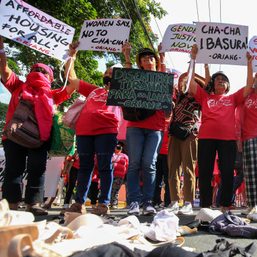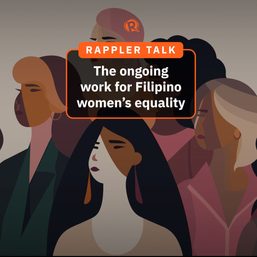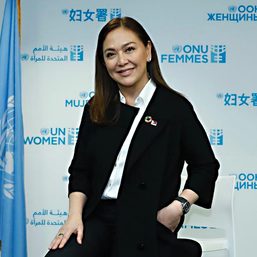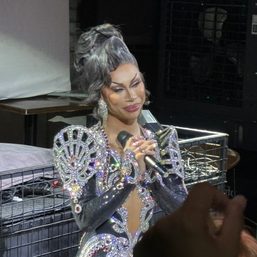SUMMARY
This is AI generated summarization, which may have errors. For context, always refer to the full article.
![[OPINION] ‘Holding space’ as a form of LGBTQ+ activism](https://www.rappler.com/tachyon/2021/06/LGBTIQ-activism-June-4-2021.jpg)
“Holding spaces” is increasingly being used in activist conversations. I first heard about this concept during a meeting between LGBTQ+ activists and one donor organization. One activist boldly suggested that perhaps donors need to “hold space” for local LGBTQ+ organizations.
Initially, I thought that the suggestion was strange considering the role of donors in providing resources to fuel our initiatives. But when there is money, there is also power, and donors hold so much of it that they can control the priorities, the design of the projects, and the outcomes. The call for donors to hold space, at least in the context of that meeting, was a request for donors to lessen their grip, and enable local groups to be, to do what they think is necessary, to commit mistakes and learn from them.
Heather Plett, the author of the book The Art of Holding Space: A practice of love, liberation, and leadership, provides a good working definition. Holding space means “walking alongside a person or group on a journey…without making them feel inadequate, without trying to fix them, without trying to impact the outcome.”
When one holds space, presence — which means being physically, emotionally, or mentally available for someone — matters. To hold space means mindfully witnessing and journeying with another person along their shared ethical principles, and offering unconditional support along the way. In a way, holding spaces is akin to maintaining a “safe space” for people to express their feelings, speak their truths, to challenge their truths — especially when these reinforce injustices — and to reimagine their futures.
June, being Pride Month, is an opportune time to hold space as a way to support queer activism. This may sound strange and may be perceived as going against the ongoing narratives of “pride as protest.” Do not get me wrong: pride is and will always be equated to activism. It is a site for collective actions in transforming unjust structures and systems that breed inequalities. How we operationalize pride, though, may need some nuance.
In the context of my involvement in LGBTQ+ advocacy in Southeast Asia, I have listened to concerns of fellow queers who face difficulties in doing activism. The difficulty of “coming out” or “being exposed” is real considering the serious social stigma and reprisals by extremist groups. There are LGBTQ+ offices being raided by the police. LGBTQ+ activists face risks of getting arrested or being banned from attending government-organized meetings. Books or films with queer content are typically censored. I am oftentimes reminded by fellow activists from conservative societies about how privileged my location is considering how relatively open Philippine society is towards LGBTQ+ advocacy.
And there is the concern over personal priorities, schedules, and time. Many LGBTQ+ activists need to work and to earn a living, support their families, care for their parents, or go to school. Not all LGBTQ+ activists are doing advocacy full-time. Aggravated by the COVID-19 pandemic, volunteer-run LGBTQ+ groups have coped with a weakened pool of human resources because their volunteers have focused more on their own personal economic survival. Overwhelmed by the tumultuous fight against the Burmese military junta, the tough act to sustain LGBTQ+ organizing amidst dictatorship, and the reality of an empty pocket, some activists have also opted to lay low for the meantime.
Activism constraints are real. We must “hold space” for those going through such challenges.
Allow me to offer some suggestions on how LGBTQ+ activists or leaders, allies, and potential allies can do so.
First, we can hold space by recognizing that all advocacy issues experienced within LGBTQ+ communities, and all advocacy actions, matter. This runs parallel with the call for diversity. It is important to recognize that queer struggles are diverse and oftentimes operate along segmented actions. The penchant to identify “the priority issue” or to work along a “main strategy,” which consequently excludes, needs to be set aside.
Meanwhile, not all can join protest marches, or speak in congressional hearings for anti-discrimination legislations, or write human rights reports, or file cases about human rights abuses. An activist who “holds space” has awareness of the plethora of activist roles and actions, and embraces every contribution as valuable.
Second, we can hold space by recognizing that power and privilege exist even within queer movements, and these consequently affect one’s access to participating within the activist space. For example, the intensive practice of online activism by seizing social media may exclude activists who do not have gadgets or access to the internet. Activism that requires physical presence, the use of highly visual images, or the use of oral conversations, may be a concern for persons with disabilities. Holding space, then, requires making reasonable accommodations available to ensure LGBTQ+ persons with disabilities participate meaningfully in our work. Activists who are in a relatively privileged position can hold space by peeling away their layers of power and privilege (perhaps due to their class position, age, “expertise, ” geographic position, gender, ability, among others) and enable marginalized voices to emerge. One holds the space by going beyond the default mode of “taking up spaces.”
Third, we can hold space by expressing solidarity with LGBTQ+ persons in the margins. We listen to each other. We amplify each other’s advocacy messages. When needed, we respond to calls for material and non-material support.
Fourth, allies can hold space by fostering meaningful partnerships with LGBTQ+ organizations. Alliance is walking alongside others towards shared imaginations of equality and inclusion. Alliance entails the process of active listening to the voices of marginalized communities, collaborating on a shared strategy (rather than imposing formulas for change), and jointly learning from the successes and mistakes made along the way.
Fifth, allies, as well as fellow LGBTQ+ leaders, can hold space by decentering themselves from the activist space. Queer activism is about uplifting the lives and wellbeing of queer people. It is not about improving one’s political, organizational, or business profile.
For allies, to hold space entails willingness to both celebrate the victories and feel the pains that queer people go through. For businesses, alliance is not just putting rainbow-inspired advertisements during pride month, which can be sheer tokenism, but also having the courage to challenge employment policies, to build inclusive workspaces, and stretch resources so LGBTQ+ employees have a fair and decent share in employment benefits.
For fellow LGBTQ+ leaders, we de-center ourselves by detaching from the capitalistic sense of ownership of the space. We consciously leave our egos at the door. We set aside competition. We transcend our turfs. By holding space, we recognize that activism victories are shared. This is difficult especially with how media, donor communities, and other institutions of power painfully expect us to produce impact that must clearly be attributed to our work.
Holding space is not a passive act. In fact, it can be tiring, draining, and even frustrating. Holding space may even feel like one is doing nothing. One must tap into energy reserves to consciously serve as an anchor, or perhaps as a cauldron from which energies of compassion, empathy, and solidarity spring forth. – Rappler.com
Ryan V. Silverio is a genderqueer human rights advocate. They are currently serving as the Regional Coordinator of ASEAN SOGIE Caucus, a regional organization that advocates for the rights of LGBTQ+ persons in Southeast Asia. This article reflects their own personal opinions.
Add a comment
How does this make you feel?











![[Rappler Investigates] Dangers of TikTok](https://www.rappler.com/tachyon/2024/04/dangers-tiktok-april-18-2024.jpg?resize=257%2C257&crop=309px%2C0px%2C1080px%2C1080px)



There are no comments yet. Add your comment to start the conversation.